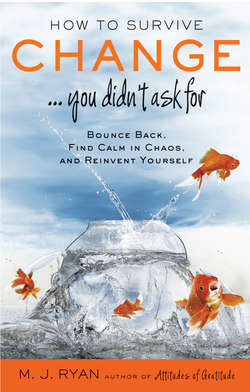Читать книгу How to Survive Change . . . You Didn't Ask for - M. J. Ryan - Страница 12
На сайте Литреса книга снята с продажи.
CHANGE TRUTH #4
ОглавлениеChange Isn't the Enemy, Fear Is
Now is the time to understand more, so that we may fear less.
—Marie Curie
I met a woman recently who told me a story that really concerned me. Jan's gardening business had dried up, she'd been living on her savings, and she was down to her last $500. One of her clients had called, letting her know of an opening as a receptionist in her husband's office that she knew Jan could fill. “He was looking for someone right away,” Jan explained to me, “and I was about to go visit some friends for the holidays. So I told her that I would see if it was still available when I got back next week.”
It took all my willpower not to yell, “Are you insane? Unemployment is sky high, you don't have a cent to your name, and you're going to take a vacation rather than a job that's virtually been handed to you?” Fortunately I controlled myself. She'd already made the call so my comment would have only made her feel terrible. But I can't stop thinking about it. What on earth was going on in her head and what lesson is in it for us?
When I asked her how she was feeling about her situation, Jan admitted to being terrified. Fear triggers the fight-or-flight response. Or more accurately the fight, flight, or freeze response. Jan was in flight, avoiding dealing with her situation in a constructive manner. All forms of denial are a flight response. But flight isn't the only option. In extreme fear, animals, including humans, have been known to literally become paralyzed. At least one of the survivors of the Virginia Tech shootings, for instance, reported that it happened to him. And traders on Wall Street have been known to freeze on the stock exchange floor while watching their clients' money disappear. It's a kind of stupor that creates an unfortunate self-reinforcing feedback loop. The stress hormones that are triggered in the fear response by the amygdala can sometimes increase the fear, making it ever more difficult for the other parts of the brain to respond. If the fear gets strong enough, the amygdala actually cuts off access to the other parts of our brain, and we lose the capacity to think rationally altogether.
Scientists have discovered that you can snap someone out of the stupor that fear can cause with a loud noise, which is why flight attendants, for instance, are now trained to yell at people to get them to move quickly out of a plane in a crash.
The other response to extreme fear is fight—my personal default setting. If I get afraid enough, my anger rises and I look for someone to attack for “making” me feel the way I do. Other people, like Jan, flee—either by literally running away or doing everything they can to avoid dealing with the reality of the change.
So how can knowing this help you? Certainly, not everyone is frightened by change. Some folks are downright exhilarated when everything gets topsy-turvy. Bring it on! they cry. The response depends at least in part on whether you tend to do a lot of innovative thinking or not. (See “What Are Your Inner Talents?” page 139.) But for those of us who like predictability and routine, times of great change can bring on intense fear.
That's why it's crucially important to recognize what we're feeling and have coping strategies in place. Fear shrinks our world and limits our ability to think creatively about our choices. It also causes us to isolate ourselves from others who could potentially help and to overgeneralize from this one situation to the feeling that the sky is falling. As we go along, I'll offer specific techniques to avoid—or at least minimize—the fight, flight, or freeze of fear and to increase our ability to accept the situation, expand our options, and make the necessary adjustments.
I know it's possible. I'm one of those who has been intimidated, rather than exhilarated, by change. I'm happy to report that over the past decade or so, I have made progress on embracing change, which I've come to see is really all about befriending my fear. For my fiftieth birthday, in fact, when former employees of mine at Conari Press wrote a poster called Fifty Things We Learned from M. J. Ryan, one of the fifty lessons was “Change is positive.” I was floored. I'm not sure if I truly taught them that, but it's certainly a lesson I strive to learn.
Let's face it—change isn't always positive. But fear is the true challenge of change. Our response to even difficult change will be easier when we learn to relate effectively to any fear that arises.
Remember Your Accomplishments
Whether this is the first time you've ever faced a big change or have encountered challenges before, to help you stay out of fear, list right now the things you've accomplished in your life so far. This will remind you that you're capable of dealing with this challenge as well. Whatever comes to your mind is fine. Here's mine: I built a business from scratch, I lived on $300 a month when I was in my twenties, I've supported myself and my family for the past fifteen years, I've traveled alone around the world, I've spoken in front of a thousand people. Every time you find yourself becoming afraid, remind yourself of your accomplishments, for example, “I put myself through college, I've raised a great son. I can handle this, too.”
